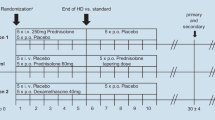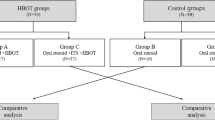Abstract
The aim of this prospective single-blind randomized controlled study was to evaluate the therapeutic efficacy of high dose intravenous vitamin C (HDVC) added to systemic steroid in patients with idiopathic sudden sensorineural hearing loss (ISSNHL). Between August 2010 and August 2011, 72 ISSNHL patients who participated in this study were randomly allocated to two groups: 36 to a control group, members of which were given systemic steroid treatment for 15 days, and 36 to a HDVC group, members of which were given HDVC (200 mg/kg/day) for 10 days in addition to steroid therapy followed by oral vitamin C (2,000 mg) for 30 days after discharge. Finally, we analyzed each group: 35 as a control group and 32 as a HDVC group. Auditory evaluations were performed by pure tone audiometry (PTA) before and ~1 month after treatment using Siegel’s criteria. HDVC group showed significantly greater complete and partial recovery improvement (p = 0.035). In addition, the complete recovery rate in the HDVC group was more than twice that of the control group (p = 0.031). In the HDVC group, PTA improved from 67.6 ± 19.8 dB HL before treatment to 37.1 ± 28.8 dB HL at 1 month after treatment, whereas in the control group, PTA improved from 70.3 ± 12.4 to 47.6 ± 25.2 dB HL, which represented a significant intergroup difference (p = 0.030). In conclusion, HDVC may enhance hearing recovery in ISSNHL patients, which suggests that HDVC reduces levels of reactive oxygen metabolites produced by inner ear ischemia or inflammation, and that HDVC could be considered for the treatment of ISSNHL.




Similar content being viewed by others
References
Hatano M, Uramoto N, Okabe Y, Furukawa M, Ito M (2008) Vitamin E and vitamin C in the treatment of idiopathic sudden sensorineural hearing loss. Acta Otolaryngol 128(2):116–121
Joachims HZ, Segal J, Golz A, Netzer A, Goldenberg D (2003) Antioxidants in treatment of idiopathic sudden hearing loss. Otol Neurotol 24(4):572–575
Kalkanis JG, Whitworth C, Rybak LP (2004) Vitamin E reduces cisplatin ototoxicity. Laryngoscope 114(3):538–542
Ahn JH, Yoo MH, Lee HJ, Chung JW, Yoon TH (2010) Coenzyme Q10 in combination with steroid therapy for treatment of sudden sensorineural hearing loss: a controlled prospective study. Clin Otolaryngol 35(6):486–489
Padayatty SJ, Riordan HD, Hewitt SM, Katz A, Hoffer LJ, Levine M (2006) Intravenously administered vitamin C as cancer therapy: three cases. CMAJ 174(7):937–942
Wilson WR, Byl FM, Laird N (1980) The efficacy of steroids in the treatment of idiopathic sudden hearing loss. A double-blind clinical study. Arch Otolaryngol 106(12):772–776
Wei BP, Mubiru S, O’Leary S (2006) Steroids for idiopathic sudden sensorineural hearing loss. Cochrane Database Syst Rev 1:CD003998
Tucci DL, Farmer JC Jr, Kitch RD, Witsell DL (2002) Treatment of sudden sensorineural hearing loss with systemic steroids and valacyclovir. Otol Neurotol 23(3):301–308
Suckfull M (2002) Fibrinogen and LDL apheresis in treatment of sudden hearing loss: a randomised multicentre trial. Lancet 360(9348):1811–1817
Maetani T, Hakuba N, Taniguchi M, Hyodo J, Shimizu Y, Gyo K (2003) Free radical scavenger protects against inner hair cell loss after cochlear ischemia. NeuroReport 14(14):1881–1884
Takemoto T, Sugahara K, Okuda T, Shimogori H, Yamashita H (2004) The clinical free radical scavenger, edaravone, protects cochlear hair cells from acoustic trauma. Eur J Pharmacol 487(1–3):113–116
Padayatty SJ, Sun H, Wang Y, Riordan HD, Hewitt SM, Katz A, Wesley RA, Levine M (2004) Vitamin C pharmacokinetics: implications for oral and intravenous use. Ann Intern Med 140(7):533–537
Levine M, Wang Y, Padayatty SJ, Morrow J (2001) A new recommended dietary allowance of vitamin C for healthy young women. Proc Natl Acad Sci USA 98(17):9842–9846
Hemila H, Koivula TT (2008) Vitamin C for preventing and treating tetanus. Cochrane Database Syst Rev 2:CD006665
Tsuruta H, Yagishita T, Shimizu M, Tamura H (2011) Megadose vitamin C suppresses sulfoconjugation in human colon carcinoma cell line Caco-2. Toxicol In Vitro 25(2):500–504
Padayatty SJ, Levine M (2001) Vitamin C and coronary microcirculation. Circulation 103(23):E117
White JD (2002) Complementary and alternative medicine research: a National Cancer Institute perspective. Semin Oncol 29(6):546–551
Rivers JM (1989) Safety of high-level vitamin C ingestion. Int J Vitam Nutr Res Suppl 30:95–102
Butz M, Hoffmann H, Kohlbecker G (1980) Dietary influence on serum and urinary oxalate in healthy subjects and oxalate stone formers. Urol Int 35(5):309–315
Tiselius HG (1980) Oxalate and renal stone formation. Scand J Urol Nephrol Suppl 53:135–148
Conflict of interest
The authors have no conflict of interest to disclose.
Author information
Authors and Affiliations
Corresponding author
Additional information
H.-S. Kang and J. J. Park contributed equally to this study.
Rights and permissions
About this article
Cite this article
Kang, HS., Park, J.J., Ahn, SK. et al. Effect of high dose intravenous vitamin C on idiopathic sudden sensorineural hearing loss: a prospective single-blind randomized controlled trial. Eur Arch Otorhinolaryngol 270, 2631–2636 (2013). https://doi.org/10.1007/s00405-012-2294-y
Received:
Accepted:
Published:
Issue Date:
DOI: https://doi.org/10.1007/s00405-012-2294-y




